It’s
seems to be hard to find an audience for a Western these days. Unless your name is
Costner or Howard,
do with you. Western novels have become a niche market for publishers,
relegated to a tiny rack in the rear of the local Fred Meyer. The other outlets
available are television and RPGs. I’d love to be reviewing a new Deadlands
book here, but instead what I’ve got are seven made-for-TV movies of varying
quality with two things in common: the word "justice" sprinkled liberally
through their teleplays, and
Flicks
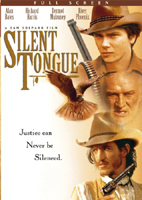 BUY IT AT AMAZON: CLICK HERE!
BUY IT AT AMAZON: CLICK HERE!
STUDIO: Lion’s Gate
MSRP: $14.99 RATED: PG-13
RUNNING TIME: 101 Minutes
SPECIAL FEATURES: None
First up
is Silent
Tongue, or "The Last Hurrah of River Phoenix".
man who sits out in the wilderness, mourning over body of his dead wife. His
father, Roe (Richard Harris), is concerned for his son’s well-being, seeing as
how the kid refuses to eat, sleep, or speak. Roe rides off to see if he can
trade some of his stock for another wife to assuage his son’s grief.
This does
not go over well. He finds another girl, the sister of the dead woman, but her
father is reluctant to part with her. Ever the gentleman, Roe kidnaps her and
sets out to offer her to his son. The girl’s father, a perpetual drunk played
by Alan Bates, follows in meandering pursuit, more interested in reclaiming the
valuable horse his daughter was riding than the daughter herself.
To add
just one more point of tension, there is also a zombie involved in this family
tragedy: the dead wife rises periodically to curse Roe’s son for not letting
her spirit pass into the next world. The makeup for this creature is not bad,
and the decision to hide only half the actress’ face behind the prosthetic
makes for a memorable and creepy visual.
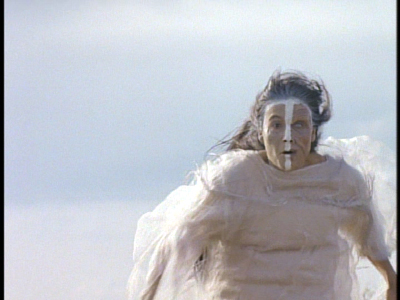
Half zombie, half Indian, all woman.
In the
end, the story is about two deaths short of being a medieval revenge tragedy,
with everybody getting roundly borked by fate. It’s not compelling, because not
one character undergoes a significant change or even has a direction. (This is
going to be a popular complaint throughout this review.) The individual
situations are handled with serviceable gravity or profanity, depending on
whether it’s Bates or Harris in the frame. The script by Pulitzer winner Sam
Shepard offers a few choice bits of dialogue, but is more concerned with the
situations, the level of narrative one step removed from the characters. It’s
unexciting that situations only communicate the old lesson that the past should
be left where it is.
5.5 out
of 10
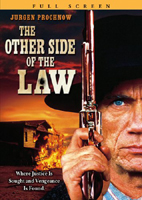 BUY IT AT AMAZON: CLICK HERE!
BUY IT AT AMAZON: CLICK HERE!
STUDIO: Lion’s Gate
MSRP: $9.98 RATED: Unrated
RUNNING TIME: 95 Minutes
SPECIAL FEATURES: None
In The
Other Side Of The Law, Yves Rénier plays a Canadian trapper who returns
home one evening to find his wife dying from a brutal rape. The trapper heads
out into the night, finds the perpetrator, and unleashes the fury of his ax.
Now a fugitive from the law, the trapper takes his infant son into hiding with
him, because it is obviously the preferable choice when compared to, say,
leaving the kid with any number of the spinster’s in town.
When the
kid turns ten, his father decides to send him alone back into town so that he
can get an education. In the town, the kid discovers the widow of the man his
father killed along with that widow’s teenaged son. Neither take a liking to
our hero, and this is where we are expected to get our drama fix. For a tension
that is meant to drive the whole of the movie, it’s pretty weak, made doubly so
by the fact that for three-quarters of the running time, the script tasks child
actors with keeping the machine of the plot interesting, and they’re just not
equal to the task.
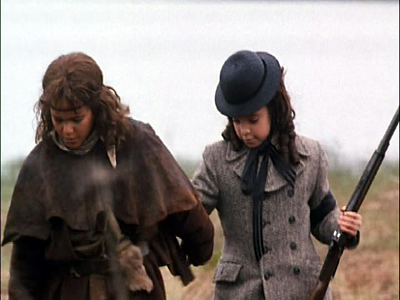
Can you spot the audience?
The
acting of these children is uniformly awful, especially when the story takes a
quick detour to explore a little love triangle between the two boys and a young
priss from
actors ought to have been playing around in, namely the justice of what the
kid’s father did and the effects of that act on the children of the town, is
abandoned for this pointless, awkward subplot, and never picked up again. The
conclusion features the worst villain I’ve been exposed to in quite a while, a
performance that was probably supposed to be "unstable" but instead
comes off as "retarded".
2.0 out
of 10
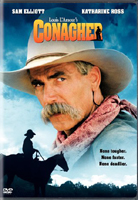 BUY IT AT AMAZON: CLICK HERE!
BUY IT AT AMAZON: CLICK HERE!
STUDIO: Warner Brothers
MSRP: $14.95 RATED: PG
RUNNING TIME: 117 Minutes
SPECIAL FEATURES: None
That’s as
good a word as any to finish off that movie, so I’ll move on to the best of
this whole bunch, Conagher, starring Sam Elliott and based on the novel of the
same name by Louis L’Amour. It features two stories that evolve separately for
about half the running time before being braided together neatly. The first is
about Evie Teale (Katherine Ross), a courageous pioneer mother who is widowed
in the first three minutes. She and her two children work the land and take
care of the new cabin their father built for them a few miles out of town, near
Apache country. They are harried by the Indians, and supported by the coach
that comes through twice a week, and generally have a hard, but successful,
time of it.
The other
thread features Conn Conagher (Elliott), a self-confident drifter with a
unobtrusive sense of honor. He signs up to ride the line for a rancher who has
been having some problems with a local gang of rustlers called Ladder Five.
Five, but he keeps it to himself, riding out after stolen cows and never
killing a man unless he draws iron first. The two stories come together as
couple of times on the way to some other goal. Each draws obvious strength from
these meetings, and the pull of the last act is the waiting for one of them to
say so.
The
quality that makes this movie stand out — and would have made me inclined to
stop and watch if I had been flipping through the channels and caught it — is
the lack of pretension. Where there are copious opportunities to spout
platitudes on justice, the teleplay backs down, lets Elliott radiate some quiet
confidence, and toss out a couple strictly personal observations. A lot of the
dialogue is subtle, filled with subtext, and the charismatic acting of both
Elliott and Ross adds all the context the audience needs. It’s good stuff, and
could have benefited from a better DVD treatment (more below).

It’s a craze, I tell ya. It reaches back in time.
7.3 out
of 10
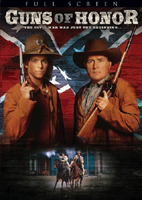 BUY IT AT AMAZON: CLICK HERE!
BUY IT AT AMAZON: CLICK HERE!
STUDIO: Lion’s Gate
MSRP: $9.98 RATED: R
RUNNING TIME: 96 Minutes
SPECIAL FEATURES: None
Back to
the not-so-good, first. Guns of Honor is a complete mess of
characters at cross purposes. It seems to have been made with only the Civil
War historian in mind, as almost no context is provided for the conflict
between characters. It’s more than a simple North v. South conflict, too, so
some amount of deeper knowledge is necessary. You need to know what defeated
former-Confederate soldiers thought of regular citizens, because fights break
out with no explanation. You need to be able to accurately guess the political
ramifications of gun-running in a post-war South, because, again, no effort is
made to familiarize the audience with the situation. Or maybe you don’t need
any of this, because there is some evidence that the story was cobbled together
by a writer himself unfamiliar with Civil War-era
because it means I don’t have to admit to being deficient in my history
knowledge.
The story
is implausible and difficult to follow. Apparently, it was intended to stretch
on as a miniseries, but was hacked down to feature length at the network’s
insistence. What remain are artifacts of subplots that exist for no other reason than
to announce their presence. The fragmented story offers no dramatic thrust, no
arc for individual characters, and no commentary other than vague proselytizing
and the bandying about of that fine word, "justice". It’s dumb and
pointless and leads nowhere. But, hey, the cinematography is all right.
1.0 out
of 10
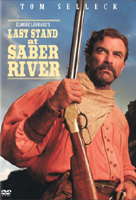 BUY IT AT AMAZON: CLICK HERE!
BUY IT AT AMAZON: CLICK HERE!
STUDIO: Warner Brothers
MSRP: $14.97 RATED: Unrated
RUNNING TIME: 94 Minutes
SPECIAL FEATURES: None
Next up
is Last
Stand at Saber River, based on a novel by Elmore Leonard. Tom Selleck
plays the lead, a man known as Cable, who returns defeated from the Civil War
to find his homestead has been squatted by Union sympathizers. These Federals,
led by David Carradine, don’t hesitate in making life rough for Cable, his
wife, and their two children, just on the principle that Rebels are worth
taunting. This all happens in the first fifteen minutes or so, and I started to
think I was in for a clearly defined conflict, but that was not to be. Both
sides descend to the same expressions of anger, and there’s even a third party
involved at the same level, a shopkeeper and closet Confederate who wants to
stir up trouble with the Union men.
I
understand the decision to make the antagonists less evil by setting the hero
on the same moral ground, but it doesn’t result in sympathetic villains. As the
story progresses, loyalties switch a couple of times for a number of
characters, but these defections are robbed of any import because both sides
look identical. Rather than Selleck’s character going up against definite
ideological differences, he ends up just shooting a lot. With nothing invested
in the struggle, the gunfights of the final act are lengthy and boring, and a
unfortunate way to end the movie.
4.0 out
of 10
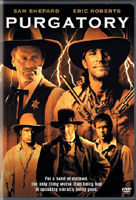 BUY IT AT AMAZON: CLICK HERE!
BUY IT AT AMAZON: CLICK HERE!
STUDIO: Warner Brothers
MSRP: $14.95 RATED: Unrated
RUNNING TIME: 94 Minutes
SPECIAL FEATURES: Trailers
To
balance that out, how about an unfortunate beginning to a movie? Purgatory
opens under the mistaken impression that gunfights are interesting in and of
themselves, with no context other than "robbery". Blackjack Britton
and his gang of bastards hold up a bank and are interrupted by what appears to
be a detachment of Union soldiers. What follows is a lengthy and poorly-staged
gun fight, filled with ineffective hammer-fannings. This goes on for way too
long, and is followed by a similarly overstretched chase sequence, at the
conclusion of which Blackjack and the gang arrive at the town of
This is
where things start to pick up. Refuge is an interesting little town. Neither
the sheriff nor the deputy carry sidearms; the citizens aren’t allowed to set
foot inside the well-stocked saloon; and all are requested to refrain from
cursing while on the main street. It seems like heaven to Blackjack and the
boys, who waste no time wreaking havoc for the poor townsfolk, faintly
wondering why nobody seems to put up much of a fight.
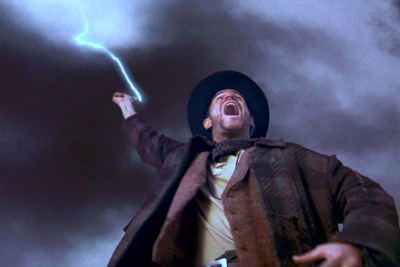
With a battery, a rod of copper, and a thick pair of rubber boots,
you can enjoy your very own lightning knife!
There’s a
perfectly good reason, of course: Refuge is actually a city of the dead,
featuring such greats as Billy the Kid, Jesse James, and Doc Holiday. Each
citizen did something horrible in his or her old life and is given an arbitrary
ten years in the town to withstand certain temptations; if they can go the
whole decade without picking up a gun or a bottle, then a strange fellow on a
black coach will come and fetch them and carry them off to some place where
it’s so bright you have to squint all the time. If, however, they show malice,
or weakness, an Indian picks them up on his plodding donkey and taken them to a
chasm of fire. Yes, Indian mystics apparently have the innate ability to ford
the river
Purgatory is never really a Western; the
historical accuracy is way off (but at least they weren’t even trying, as
opposed to Guns of Honor). It’s more of a fantasy. The distinction is important,
because fantasies and Westerns tend to follow different rules of internal
cohesion, with far more being demanded of a Western than of a fantasy. And,
true to form, this fantasy breaks down on scrutiny. Does Refuge welcome all
those who die? It seems to, as some folks who die during shootouts rise right
back up. If so, why isn’t it more crowded? Why do only some of the dead rise
again, and not others? No explanations are given.
The
threads of redemption for Jesse James and the others are wound up a bit too
neatly at the conclusion, and leave you with a mixed idea of the Creator as
exists within the frame of mythology. It’s a deus ex machina situation which makes a lot of preceding drama
irrelevant. However, in that time between the end of the beginning and the
beginning of the end, Purgatory is a fun show, and it’s a
great moment when the outlaw legends of the West rise up like superheroes
during the last (poorly choreographed) gun battle.
6.2 out
of 10
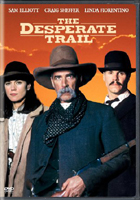 BUY IT AT AMAZON: CLICK HERE!
BUY IT AT AMAZON: CLICK HERE!
STUDIO: Warner Brothers
MSRP: $14.97 RATED: R
RUNNING TIME: 92 Minutes
SPECIAL FEATURES: Trailers
Last up
is The
Desperate Trail. I don’t know exactly which trail they’re talking
about; none of the trails seemed particularly desperate to me. The story
follows a pair of outlaws (Linda Fiorentino and Craig Sheffer) who separately
attack the same coach in order to steal the strongbox full of cash. The cash
switches hands a few times as the outlaws try to outrun each other and the law.
It’s a cat-and-mouse-and-mouse structure that seems like it could be
interesting until the outlaws decide to work together, dispensing with one of
the points of the triangle. It’s more fun when criminals refuse to work
together, or agree to play along while they hatch their own plots, but the
tension between Fiorentino and Sheffer disappears all too quickly.
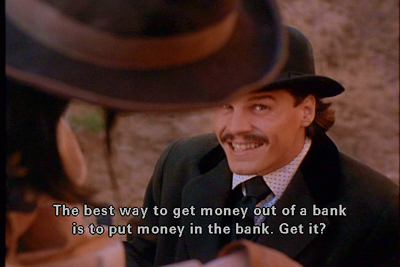
You might want to rethink your cunning plan.
They keep
up an easy banter throughout the movie, which is entertaining if a bit
anachronistic. Occasionally it sounds as though they’re playing as Tom Hanks
and Meg Ryan rather than wanted criminals. It’s a poor substitute for actual
tension. Sam Elliott is fine, once again, but gets next-to-nothing to do as a
relentless marshal on the trail of the two outlaws. He looks bored, though it’s
a bit hard to tell under that godlike moustache.
The
movie’s lightweight and features an aborted dramatic arc; the dialogue is fun,
but there’s just not much behind it. That seems an appropriate summation for
more than one of these movies.
4.6 out
of 10
The Looks
Fullscreen,
with television quality. Some of the transfers (Conagher, Purgatory, Guns of
Honor) are clean, some (Silent Tongue, The Other Side Of The Law)
are filthy. The latter have frequent artifacting around definite lines.
None are
given very deep color palettes, which is understandable for those like Silent
Tongue which take place almost entirely in the brown desert; others,
like Purgatory,
have significant sections in forests, and yet the colors are dull. The blacks
are, uniformly, dull purples and blues left over from cranking up the contrast.
The
cinematography for each is uncreative, as you might expect from a TV budget.
Two-shots, long shots of approaching stagecoaches, the occasional "lone
man on the wide prairie" shot — nothing spectacular, but, at the same
time, nothing distracting. It’s serviceable.
Mostly,
they look like dirt; lots and lots of dirt.
4.0 out
of 10
The Noises
Dolby 2.0
all across the board. Nothing spectacular.
The music
choices are mostly awful. The Other Side Of The Law sounded
like it was scored by Goblin feeling lonely, and the composer for Guns
of Honor would not, not let
go of his snare. The music for Conagher is appropriately period.
Nothing else stands out.
3.4 out
of 10
The
Goodies(s):
Trailers
for other TV movies. Other than that, not a damn thing.
0.1 out of 10
The
Artworks:
Let’s
break it down. Silent Tongue: Floating heads, and Richard Harris doesn’t even
get his full head! He is consigned to being simply a face with blurred edges so
as to blend in with River Phoenix and Dermot Mulroney. The actors are
right-justified, leaving a big block of white to the left, which is just
unbalanced. There is also a bird, probably a Pointless Albatross.
The
Other Side Of The Law: Hello, Mr. Prochnow. Even though you aren’t
really a fixture of the movie, you are the most ruggedly handsome face we have
at our disposal. Plus, you’re the only actor in this movie that can grimace
without giggling.
Conagher: Sam Elliott, you beautiful, beautiful man. The complementary
color scheme reminds me a bit of a comic book, and the font calls to mind the
cover of a Preacher TPB. A single bust floating in the sky, though, does
not a good cover make, though I’m sure a porn auteur or two would contend that.
Guns
of Honor: They tried very hard to make this look like a rip-roaring
Civil War adventure, but it’s just awful. The color-balance on the two actors’
costumes is just off when it comes to the Confederate flag behind them and the
stupid iris effect in the lower quadrant is just tacky.
Last Stand At
it looks like the cover of a dimestore novel, from the font to the pose. Tom
Selleck looks the part, but I just can’t understand the fascination with pink
shirts. Is it a cultural thing? Was pink an expensive dye, so it showed off the
wearer’s wealth?
Purgatory: Cheesy lightning and a bunch of grim actors. The
font is an awful, embossed copperplate.
The Desperate Trail: Even less to
say about this one. Three actors. One Sam Elliott. No busts.
3.8 out
of 10
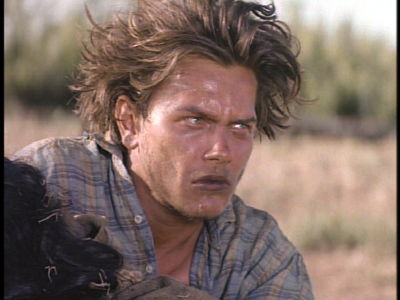
Knock knock. Who’s there? Boo. Boo who?
When
television and a dying genre collide, these are the results. I wish I could say
I had fun with all of these movies, but I didn’t. I can see myself recommending
Purgatory
and Conagher to a certain type of friend. I can see myself entirely
forgetting Guns of Honor and The Other Side Of The Law.
The Wild
West is a setting full of weariness, but these filmmakers all took that a bit
too far. These movies exemplify, to varying degrees, a weariness of genre, of convention, and of
technique.
Overall:
4.7 out of 10